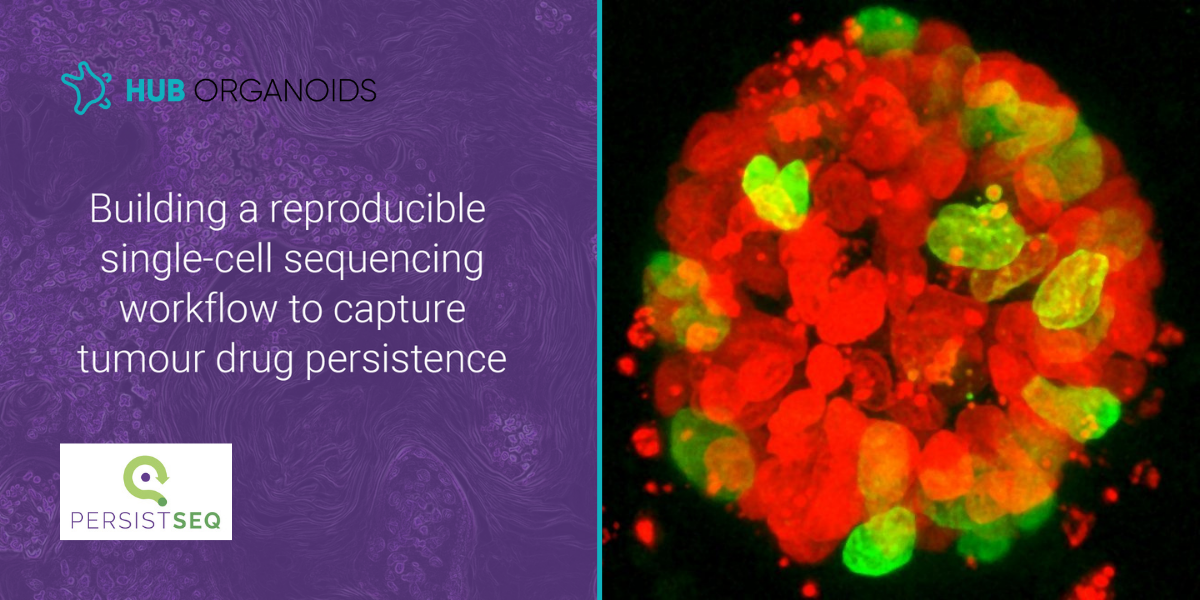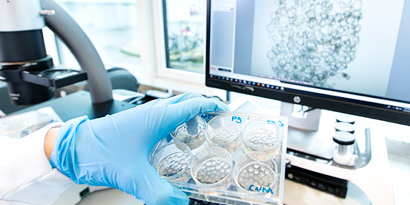
2 September 2021, Utrecht (The Netherlands) – Hubrecht Organoid Technology (HUB) joins a new international consortium of academic and industrial leaders in the field of cancer research which launches “PERSIST-SEQ”, a five-year public-private collaborative research program that aims to unravel drug resistance and develop smarter therapeutic strategies to treat cancer and prevent resistance. PERSIST-SEQ will provide the cancer research community with a new gold standard workflow for single-cell sequencing by developing and validating best practices as well as generating and analysing high-quality data. The program is funded by the Innovative Medicines Initiative (IMI), and led by the Oncode Institute and AstraZeneca.
Cancer takes 9.6 million lives each year, 90% of which result from untreatable cancer relapse occurring after initially effective treatment. Therapeutic resistance is one of the primary causes of cancer death and is clinically difficult to predict, prevent or treat. Although resistance has been studied extensively in the last decades, there is no comprehensive understanding of its underlying mechanisms, nor how they differ between cancer types or therapies. A more accurate understanding of these mechanisms can contribute to better patient stratification, as well as improved cancer treatment strategies to overcome resistance, however it requires advanced molecular tools and preclinical models that preserve each patient’s molecular pathology.
“Drug resistance in cancer is one of the greatest causes of mortality and despite increasing success with targeted therapies in the clinic, how cancer cells survive drug treatment is still not well understood. We are excited to co-lead this European industry-academic partnership, using state-of-the-art single-cell sequencing to characterise 5 million single cells over 5 years to understand and overcome drug resistance.” – Ultan McDermott (AstraZeneca), industrial co-lead of PERSIST-SEQ.
Current experimental approaches fail to study residual disease, the major cause of cancer relapse, and therapeutic resistance in clinically meaningful ways. In the last years novel methods in single-cell sequencing have seen significant advancements. Such techniques combined with advanced cancer patient-derived models such as organoids, which faithfully preserve original tumor genetic background and molecular pathology, can shed light on the intricate processes underlying therapeutic resistance and residual disease. Understanding the mechanisms of cancer resistance is crucial to enable its mitigation and requires a coordinated effort. To address these challenges, PERSIST-SEQ has formed a coalition of field-leading researchers and medical oncologists on cancer resistance who will leverage their ingenious cancer modelling approaches and cutting-edge techniques to perform the sequencing of single tumour cells. PERSIST-SEQ will refine and standardise a broadly applicable workflow for single-cell sequencing in order to improve the understanding of therapeutic resistance in cancer and develop targeted prevention and mitigation techniques.
“HUB is very excited to be contributing to this project by building new patient-derived organoids that will be used to characterize the gene expression profiles of treatment resistant cancer clones. This will contribute to improving our understanding of cancer drug resistance and ultimate lead to more informed patient selection for clinical trials” – Dr. Sylvia Boj, CSO (Hubrecht Organoid Technology).
About the PERSIST-SEQ consortium
The ultimate goal of the PERSIST-SEQ consortium is to improve the understanding of therapeutic resistance in cancer and create effective strategies to improve cancer treatment and prevent drug resistance. As a result of this effort, the project anticipates a significant step forward for the cancer community and its understanding of tumour plasticity. This can change the way scientists and clinicians view cancer and its related drug developments. In order to achieve this goal, PERSIST-SEQ will develop a standardized approach to single-cell sequencing workflows for the investigation of cells pre-treatment. Uniquely, all experiments and pre-processing of data will be done at Single Cell Discoveries. This will ensure standardisation and continuity of both experimental and bioinformatics workflows throughout the project. Importantly, PERSIST-SEQ will employ an open access model to build and sustain its benchmarking procedures and centralized European data infrastructure. This model reduces duplication of effort, thereby promoting collaboration across disciplines and ensuring efficient adoption of state-of-the-art single cell technologies. By presenting an approach which is replicable, the PERSIST-SEQ consortium will facilitate a further investigation of unaddressed tumours and therapies. Therefore, the real impact of the project will stem from the growth of innovation capacity associated with the use of this approach across academic and industrial centres around the world.
PERSIST-SEQ is a public-private partnership funded by the IMI, with representation from academic institutions, small- and medium-sized enterprises, public organisations and pharmaceutical companies. The partners involved in the project are Oncode Institute, Hubrecht Institute, Netherlands Cancer Institute, Single Cell Discoveries, Lygature, Wellcome Sanger Institute, Fondazione del Piemonte per l’Oncologia, Hubrecht Organoid Technology, Institute for Research in Biomedicine (IRB Barcelona), Vall d’Hebron Institute of Oncology, Xenopat, AstraZeneca, Merck KGaA, Darmstadt, Germany, Bayer, Transgene, Charles River.
For more information, visit the PERSIST-SEQ website.




